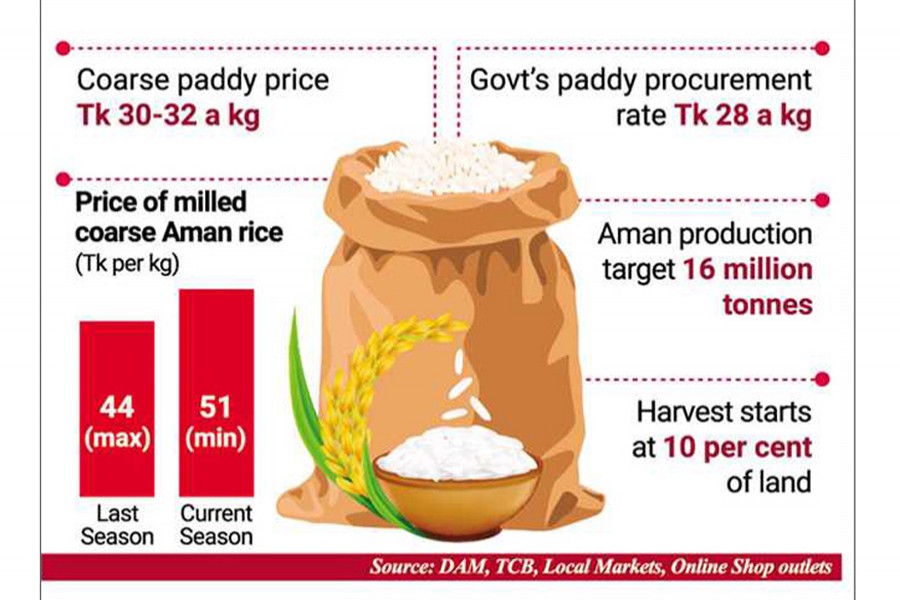Paddy prices hit record highs even though Aman harvest gets underway across Bangladesh with coarse varieties selling at Tk 30-32 a kilogram, giving insiders to presume that rice may also get pricier in weeks.
Market experts say such high-priced paddy could raise prices of the husked rice in the coming week as well and it could also affect government procurement that is aimed at boosting stock in silos to manage any exigency especially in the wake of a global crisis.
However, coarse rice from Boro season was still selling at Tk 44-55 a kg (mill-gate to Dhaka), medium Tk 54-65 and finer Tk 65-98 a kg (mill-gate area to Dhaka), according to the Trading Corporation of Bangladesh, the Department of Agricultural Marketing (DAM) and online-shop outlets.
While visiting many mokams or places for raw agro-product trade in Dinajpur and Nilphamari districts last week, the FE correspondent found such an outlook of the new paddy harvest and marketing.
"New milled coarse rice from Aman season would cost a minimum of Tk 51 a kg at mill gates if the current trend in paddy price continues," Boleshwar Ray, a grain trader at Bhabaniganj Haat in Nilphamari Sadar, told the FE.
He said newly harvested Guti Swarna, and Mamun dhan varieties were selling at Tk 2350-2400 per 75- kg sack while Dhanigold, a medium- quality variety of paddy, at Tk 2600 a sack.
He said Swarna-5, Katari, BRRI dhan-34 and other finer varieties were yet to be harvested.
"50-60 farmers came to Bhabaniganj Haat today who sold their products within two to three hours amid high demand," Ramij Ali Basunia, a farmer in the Hajiganj area, said.
He thinks prices are high as the yield per decimal has declined to some extent this year amid a shortage of fertiliser and water in peak growing seasons.
"I sold 17 maunds or nine sacks of paddy at Tk 2380 per sack from my two bighas of land," he said.
Jaber Alam, a farmer at Khansama Haat in Dinajpur, told the correspondent that big farmers would not sell paddy now while small farmers are also preserving paddy on a large scale sensing any possible food scarcity.
"And millers and their allied traders are hunting paddy even from the farmers' fields, resulting in a surge in prices," he says about the tricks of the trade.
He said farmers are quite happy with the current rates of paddy as most of them are making 10-12-percent profits over the cost price.
Contacted, secretary of Bangladesh Auto Major Husking Mill Owners Association (BAMHMOA) K M Layek Ali said the paddy season started with high rates as the Guti Swarna variety is selling at Tk 1250-1300 per maund which is much higher than that of the government procurement price set at Tk 1120 (Tk 28 a kg).
He feels success of the government's rice and paddy procurement drive highly unlikely amid such a hike in market prices. The Director General of Food (DGoF) has targeted to procure 0.5 million tonnes of rice at Tk 42 a kg and 0.3 million tonnes of paddy at Tk 28 a kg.
The government warehouses have a stock of 1.3 million tonnes of rice now, said the DGoF.
Consumers Association of Bangladesh (CAB) vice-president S M Nazer Hossain says the government should ease import by removing all kinds of import duties (now above 15 per cent) for now as global prices have increased notably in last few months.
The government procurement should be fulfilled to run safety-net programmes smoothly, he suggests.
"And market monitoring in the mill gates, city wholesales should continue to avert any artificial price hike," he says.
Only 0.25 million tonnes of rice could be imported so far in the current financial year against a permit of 1.4 million tonnes by the food ministry.
However, the agriculture ministry was expecting 16 million tonnes of rice output from this Aman season while harvest in above 10 per cent of land has so far been completed, as of November 10.
Economists suggest that the government should build up adequate food stock so that prompt market intervention can be made to forestall price fixing by oligopolies as reports say big businesses now stake bets on select farm products to make a killing on heated market.


